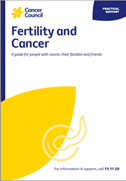- Home
- About Cancer
- Managing side effects
- Fertility and cancer
- Preserving fertility in children and adolescents
Preserving fertility in children and adolescents
When a child or adolescent is diagnosed with cancer, there are many issues to consider. Often the focus is on survival, so health professionals and families may not immediately think about fertility. Many young people say that fertility is important to them.
Learn more about:
Overview
Some cancer treatments do not affect a child’s reproductive system. Others can damage the ovaries, which contain eggs, or the testicles, which make sperm. Sometimes this damage is temporary, but sometimes it’s permanent. For more details on how cancer treatments affect fertility, see Treatment side effects and fertility.
Below you can find an overview of ways to prevent or lower the risk of infertility. Some of these procedures are experimental and available only in specialised centres.
In many cases, decisions about fertility preservation are made before treatment begins. Often the decision involves specialists, the young person and their parents or carers. Parents of children under 18 will usually need to consent to any fertility preservation procedures.
Ways to preserve fertility in young females
The options will depend on whether the young person has been through puberty. Most young females go through puberty between the ages of 8 and 13.
|
Before puberty |
|
|
After puberty |
|
|
Before or after puberty |
|
Ways to preserve fertility in young males
The options will depend on whether the young person has been through puberty. Most young males go through puberty between the ages of 9 and 14. After puberty, semen contains mature sperm.
|
Before puberty |
|
|
After puberty |
|
|
Before or after puberty |
|
The National Ovarian and Testicular Tissue Transport and Cryopreservation Service allows young people to have their ovarian or testicular tissue harvested by their own fertility specialist and then transported and stored at the national cryo-bank at the Royal Women’s Hospital (Melbourne).
→ READ MORE: Other ways to be a parent
Podcast for people affected by cancer
Listen now
More resources
Prof Martha Hickey, Professor of Obstetrics and Gynaecology, The University of Melbourne and Director, Gynaecology Research Centre, The Royal Women’s Hospital, VIC; Dr Sally Baron-Hay, Medical Oncologist, Royal North Shore Hospital and Northern Cancer Institute, NSW; Anita Cox, Cancer Nurse Specialist and Youth Cancer Clinical Nurse Consultant, Gold Coast University Hospital, QLD; Kate Cox, McGrath Breast Health Nurse Consultant, Gawler/ Barossa Region, SA; Jade Harkin, Consumer; A/Prof Yasmin Jayasinghe, Director Oncofertility Program, The Royal Children’s Hospital, Chair, Australian New Zealand Consortium in Paediatric and Adolescent Oncofertility, Senior Research Fellow, The Royal Women’s Hospital and The University Of Melbourne, VIC; Melissa Jones, Nurse Consultant, Youth Cancer Service SA/NT, Royal Adelaide Hospital, SA; Dr Shanna Logan, Clinical Psychologist, The Hummingbird Centre, Newcastle West, NSW; Stephen Page, Family Law Accredited Specialist and Director, Page Provan, QLD; Dr Michelle Peate, Program Leader, Psychosocial Health and Wellbeing Research (emPoWeR) Unit, Department of Obstetrics and Gynaecology, The Royal Women’s Hospital and The University of Melbourne, VIC; Pampa Ray, Consumer; Prof Jane Ussher, Chair, Women’s Health Psychology, and Chief Investigator, Out with Cancer study, Western Sydney University, NSW; Prof Beverley Vollenhoven AM, Carl Wood Chair, Department of Obstetrics and Gynaecology, Monash University and Director, Gynaecology and Research, Women’s and Newborn, Monash Health and Monash IVF, VIC; Lesley Woods, 13 11 20 Consultant, Cancer Council WA.
View the Cancer Council NSW editorial policy.
View all publications or call 13 11 20 for free printed copies.
Need to talk?
Support services
Coping with cancer?
Speak to a health professional or to someone who has been there, or find a support group or forum
Need legal and financial assistance?
Pro bono services, financial and legal assistance, and no interest loans
Cancer information
Sexuality, intimacy and cancer
Learn more about the impacts of cancer on sexuality and intimacy
Dealing with the diagnosis
Common reactions to a cancer diagnosis and how to find hope

